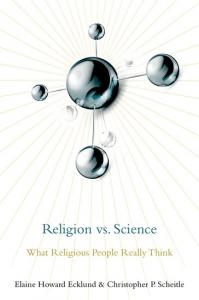 Are all scientists sharks out to eat religious people for lunch? Do many religious people really believe this? Are religious Americans scientifically ignorant, uninterested or or hostile toward science?
Are all scientists sharks out to eat religious people for lunch? Do many religious people really believe this? Are religious Americans scientifically ignorant, uninterested or or hostile toward science?
Several years ago I read and posted on a fascinating book by Elaine Howard Ecklund, Science vs. Religion: What Scientists Really Think. Elaine Ecklund is sociologist at Rice University. The work reported in this book drew on an extensive survey of nearly 1700 professors at twenty one “elite” universities, in seven core disciplines (chemistry, physics, biology, sociology, economics, political science, and psychology), augmented by detailed interviews with 275 of them. I have spent all but three of the last 36 years, as graduate student, postdoc, and professor, at Universities included in Ecklund’s study. This book hit the target. I found nothing surprising, but much that provoked thought. Now Elaine, with coauthor Christopher P. Scheitle (Sociology, West Virginia University) has a new book looking at the other side of the equation: Religion vs. Science: What Religious People Really Think. Like the first book, this one draws on extensive survey and interview data to analyze the range of views among Christians, Jews, and Muslims and fleshes out the dry data with personal stories and anecdotes. As in the first book, I find nothing especially surprising – but much that provokes thought, and should stimulate some good conversation.
From the introduction:
The way religious Americans approach science is shaped by two fundamental questions. First, what does science mean for the existence and activity of God? Second, what does science mean for the sacredness of humanity? How these questions – questions with profound moral implications – play out as individual believers think about science both challenge stereotypes and highlight the real tensions between religion and science. (p. 2, emphasis added)
Ecklund and Scheitle hit the nail on the head here. For some the issue is Biblical authority, or the impact on some favored theological construction but the most significant questions on this blog over the years, and I’ve been at this for ten years now, have dealt with human uniqueness – what does it mean to say humans are created in the image of God – and room for divine action (miracles anyone?). This means that evolution and common descent raise significant questions that must be addressed. It also means that moral questions surrounding life and death – abortion, euthanasia, stem cell research, genetic manipulation, cloning – are significant. A religious worldview does impact our views on some significant “scientific” questions.
On the other hand, religious outlook has very little to do with a person’s impression of climate change and global warming.
Our survey data show that even among those who hold the view that “God created the universe, the Earth, and all of life withing the past 10,000 years,” more than 72% acknowledge that the climate is changing and human activity has made at least some contribution to that change. Political conservatism and a lack of trust in the scientific community are much stronger direct predictors of climate-change denial than is religious identity. (p. 8)
 It is true that many white evangelicals are politically conservative and thus a correlation between white evangelicals and climate-change denial may exist – but correlation is not the same as causation. Climate-change denial does not seem to be a position rooted in religious belief. On the other hand, religious belief does help shape an approach toward environmental concerns.
It is true that many white evangelicals are politically conservative and thus a correlation between white evangelicals and climate-change denial may exist – but correlation is not the same as causation. Climate-change denial does not seem to be a position rooted in religious belief. On the other hand, religious belief does help shape an approach toward environmental concerns.
We do find, however, that some religious Americans, particularly evangelicals, are uncomfortable when they feel environmental concerns elevate the earth above God or deny God’s ability to intervene in the world. (p. 8)
Humans are called to stewardship – but the Christian belief holds that the Earth was created for human occupation. The love of other humans created in the image of God works against some extreme forms of environmentalism. What appears to be earth worship is regarded as another form of idolatry.
Myths We Believe … In her earlier book Elaine Ecklund looked at myths about science vs. religion. It is a myth that many if not most scientists are deeply hostile, actively working against religion. Only ~2% of the cohort of elite scientists interviewed for Science vs. Religion were actively hostile. Another myth is that there are no religious scientists, especially at our elite Universities. Yet Ecklund found that 18% of the scientists attended religious services at least once a month. About 7% are conservative to moderate Protestants or Catholics, about 17% are liberal Protestants or Catholics.
In the current book Ecklund and Scheitle address myths about religious people. Myths like religious people do not like science or scientists, religious people are not scientists, religious people are all young-earth creationists and/or climate change deniers, religious people are against scientific technology.The last is interesting – Ecklund and Scheitle dig into some serious issues: reproductive genetic technologies, in vitro fertilization, and human embryonic stem cell research. Here the biblical understanding of the sanctity of life plays a large role for many Christians. It isn’t science denial, but the need for morally grounded oversight. Not everything that can be done should be done.
We need to move beyond the myths and understand why people hold the views they hold – especially when it impacts something we value.
Our message to scientists is this: Myths are a problem for the scientific enterprise. The majority of American people are religious. This means religious people pay taxes and vote. … It is important for us to move beyond stereotypes to know exactly why some religious Americans reject evolution if we hope to help them accept what science teaches about the origin and development of life on earth. (p. 3)
Our message to people of faith is this: Myths are a problem for faith communities. Science is incredibly influential in our world, and if religious leaders want to see their communities not just survive but thrive, they must learn how to incorporate science and scientists into their faith communities. (p. 3)
The conflict motif drives some Christians away from faith and prevents many non-Christians from even considering Christian faith as a viable option. This is not a healthy place for the church. The conflict motif also takes Christians away from the table when many significant moral issues are discussed, including such topics as genetic technologies and stem cell research. We need to be in the conversation.
In future posts we will work through some of the findings reported by Ecklund and Scheitle – I look forward to the conversation.
What does science mean for the existence and activity of God?
What does science mean for the sacredness of humanity?
Do you agree that these are the two most significant questions? What might you add?
If you wish to contact me directly you may do so at rjs4mail[at]att.net.
If interested you can subscribe to a full text feed of my posts at Musings on Science and Theology.











